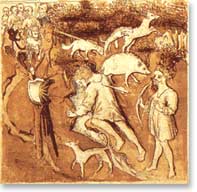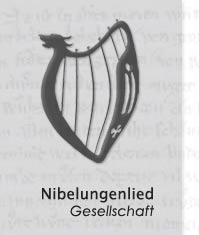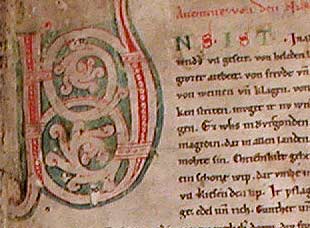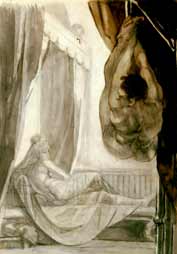|
The
Nibelungenlied
from Ulrike Schäfer
|
.... |
Nibelungenlied Hs*C, Foto: BLB Karlsruhe ..
|
Short Summary of the Nibelungenlied
The kings Gunther, Gernot and Giselher, and their sister Kriemhild live at the court in Worms, which is the capital of the kingdom of Burgundy.
They are surrounded by loyal liegemen such as Hagen of Troy, the minstrel Folker from Alzey, Ortlieb of Metz, Dankwart and many others. One night, beautiful Kriemhild dreams of a falcon rent to pieces by two eagles. Her mother, Uta, interprets the falcon as her lover, so Kriemhild decides never to fall in love. But far from it. Soon after, Siegfried of Xanten, curious to see the fabled charming queen, arrives at the Worms court. On his way, he had captured the Treasure of the Nibelungs, including the sword Balmung and the Cloak of Darkness (which makes its bearer invisible), and made himself ruler of the Nibelungs. He had also killed a dragon and bathed in his blood, which made him invulnerable.
|
|
.... |
At first Siegfried decides to be Gunther's vassal, takes the field in the Saxon wars for him and gains his confidence.
When Gunther asks him to win strong Brunhild of Isenland for him, he agrees, on condition that he may marry Kriemhild. The Cloak of Darkness makes it easy for Siegfried to overwhelm Brunhild in a sort of combat sports game in Isenland, and so the Burgundians return to Worms in triumph. A double wedding is performed. But Brunhild senses that the man entering her bedchamber is not her true husband. She ties him and hangs him up at the wall. Siegfried helps once again, taking her girdle awayfrom her. The conflict seems resolved. Siegfried and Kriemhild set off for Xanten.
Brunhild and Gunther, J. H. Füssli, 1807
|
Years later, Brunhild presses them to return for a visit, wondering why Gunther's vassal hasn't been at the court for such a long time to serve his master. Shortly after their arrival, the furious quarrel breaks out between the ladies, which peaks in front of the Cathedral. When Brunhild, being the King's wife, claims to enter the church in front of the vassal's spouse, Kriemhild reveals that it was Siegfried who defeated her and shows her the girdle to show proof. Dismayed by Brunhild's grief, Hagen decides to avenge the humiliation of his king's wife. He fakes a war and talks guileless Kriemhild into sewing on Siegfried's coat a patch marking the only spot where the hero remained vulnerable, since a linden leaf stuck there when he was bathing in the dragon's blood.
The so-called war quickly turns into a hunting contest in the nearby Odenwald forest. When Siegfried bends to sip the water of a fountain, Hagen kills him from behind with his spear. The next day Kriemhild finds the corpse in front of her chamber. When Hagen later passes the bier in the Cathedral, the wounds of the dead body open up again, and Kriemhild recognises the murderer.
Death of Siegfried, Hundeshagen-Handschrift, 15 Jh.
|
.... |
 |
|
|
.... |
The desperate widow swears to herself to take the Treasure and find new friends and avengers. To avert this, Hagen steals the Treasure and throws it into the Rhine.
Kriemhild stays mourning for many years until Rudeger of Bechelaren pays a visit to Worms and asks for her hand on behalf of Etzel, king of the Huns. She goes to the land of the Huns and becomes Etzel's wife. Years later, she invites her brothers and their followers to Hungary.
Although Hagen warns them not to go, the Burgundians, whom the poet from now on calls Nibelungs, set off. While they are crossing the Danube, three wise water nymphs tell him that none of the Burgundians but the chaplain will survive the travel. To see for himself whether it is true, Hagen throws the chaplain into the Danube, but with God's help the chaplain manages to swim to the other side. After a pleasant stay in Bechelaren, the Nibelungs arrive at Etzel's castle. Kriemhild gives them a cool welcome, and it is obvious that she still thinks of revenge.
Hagen and Folker can frustrate her first plans, but eventually a brutal massacre takes its course, only sparing Gunther and Hagen on the Burgundian side. To make Hagen tell her the place where he lowered the Treasure, Kriemhild has her brother Gunther beheaded.
Franz von Stuck, Der Nibelungen Not, 1920
|
But when Hagen still says nothing, she kills him with Siegfried's sword. Horrified to see this, Hildebrand, Dietrich of Berne's armour bearer and mentor, cuts her head off. This is where the Nibelungenlied ends, or, in the original language: "Das ist der Nibelunge Lied" (as Manuscript C reads).
Introduction
|





